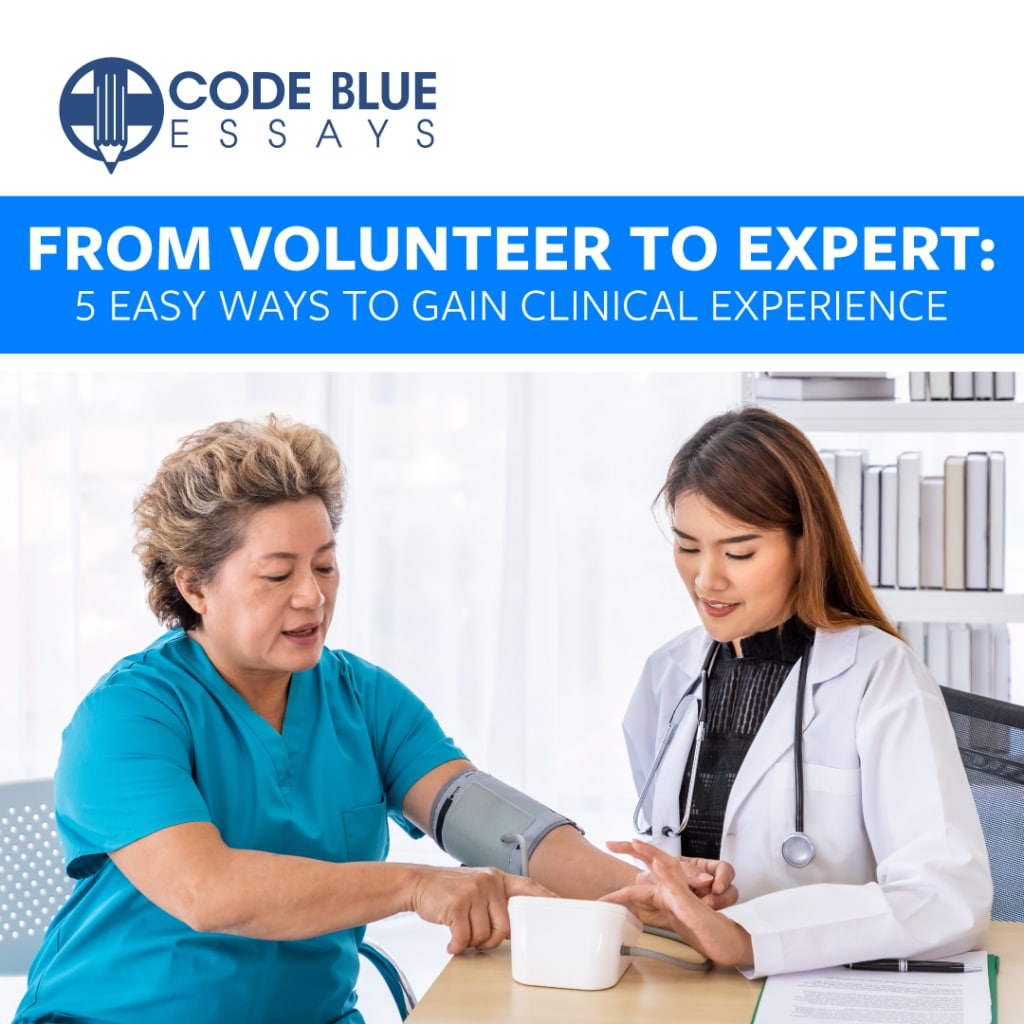From Volunteer to Expert: 5 Easy Ways to Gain Clinical Experience
0 Comments

December 5, 2023 in Clinical Experience
Building a strong foundation of clinical experience is an essential step toward medical school admission. Not only does it demonstrate your dedication and passion for the field, but it also allows you to gain a deeper understanding of the healthcare system and the role of a physician.
In this blog post, we’ll explore five easy ways to gain clinical experience and how Code Blue Essays’ Medical Journal product can help you keep track of your experiences and stand out as a well-rounded applicant. You’ll go from a volunteer to an expert in no time!
The Importance of Clinical Experience Before Medical School
Clinical experience is an invaluable component of a strong medical school application. It not only demonstrates your commitment to the field but also provides you with firsthand exposure to the realities of healthcare and the role of a physician. By gaining clinical experience, you have the opportunity to help treat patients firsthand and develop crucial skills such as communication and teamwork. Plus, you’ll gain a deeper understanding of the healthcare system.
Admissions committees are looking for well-rounded applicants who have explored the medical field and have a genuine passion for patient care. Clinical experience allows you to demonstrate these qualities and shows that you have taken the initiative to gain experience and learn from physicians in your community. It will provide you with valuable experiences and insights that can shape your future career.
So, whether it’s shadowing a doctor, volunteering at a hospital, or participating in a research project, make sure to prioritize gaining clinical experience before applying to medical school. Based on research, the average amount of clinical experience recommended before you apply to medical school is 100 hours. The time you dedicate will not only enhance your application but will equip you with the skills and knowledge necessary to become a doctor.
Five Easy Steps to Gain Clinical Experience
Building clinical experience is important, but where do you start? Here are five easy steps to help you gain valuable clinical experience and enhance your medical school application.
1. Shadowing: Spend time with doctors in different specialties to observe their day-to-day work and gain insights into the medical field. Shadowing provides invaluable exposure to patient care and helps you understand the roles and responsibilities of physicians. Learn more about why shadowing is so important and how you can shadow effectively.
2. Volunteering: Join a hospital or healthcare organization as a volunteer. This allows you to interact with patients, and healthcare professionals, and gain hands-on experience in a healthcare setting.
3. Research: Participate in research projects related to medicine. This not only enhances your critical thinking and analytical skills but also demonstrates your dedication to advancing medical knowledge.
4. Internships or Clinical Externships: Look for opportunities to work as an intern or clinical extern, where you can gain practical experience and learn from experienced professionals. These programs provide real-time experiences and expose you to different specialties.
5. Community Health Programs: Get involved in community health initiatives or outreach programs. This will show that you work with diverse populations, can address healthcare disparities, etc.
Remember, gaining clinical experience is not only about accumulating hours but also about the quality of your experiences and the impact they have on your personal growth.
Maximizing Your Clinical Experience with The Medical Student’s Journal
The Code Blue Essays’ Medical Student’s Journal is a powerful tool that can help you make the most of your clinical experience. This innovative product allows you to track and document your experiences, ensuring that you don’t miss any important details.
With this journal you can:
The Medical Student’s Journal will be an easy way for you to showcase your clinical experience to medical school admissions committees. You can easily generate a comprehensive report of all your clinical activities, complete with dates, hours, and reflections.
Because the Medical Student’s Journal gives you a place to write detailed reflections on each experience, you can remember your thoughts, feelings, and key takeaways so that you can self-reflect, set goals, track your progress, etc.